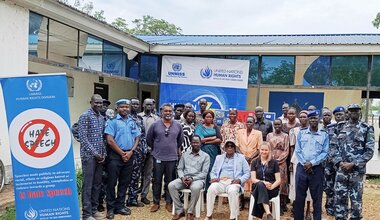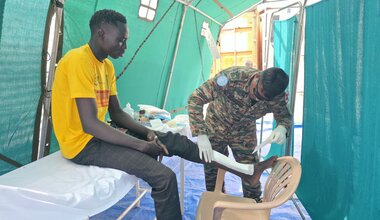Life slowly returning to Bor
When fighting broke out in South Sudan in mid-December, Peter Manyok was attending university in Western Bahr El-Ghazal, far from his family in the Jonglei State capital Bor.
This week, Mr. Manyok returned home, one of hundreds of residents trickling back to a town that was the scene of major fighting between pro and anti-government forces.
There is more life in Bor now towards the end of February than there was a month ago, when visitors to the state described it as a ghost town, with dead bodies strewn along its streets. With UNMISS Korean Engineering contingents assisting with grave digging, the government has been burying the bodies.
A short tour of the town revealed small market areas open, with young men selling household wares. Women in makeshift restaurants were making tea and cooking food to sell.
The town may not be a flurry of activity, but people were walking around as normally as might be expected in a peaceful setting.
Yet the effects of war were still all too obvious. Carcasses of cows, which were obviously caught in the crossfire, littered the main roads, as did vehicles abandoned by drivers fleeing to safety, or perhaps killed.
A few buildings still stood, but were empty, covered in heavy soot and in total disrepair. The rest, like what was once the main market or Mr. Manyok’s homestead, were rubble.
“The room they burned is the room where you put everything,” he said. “When they (saw) the room (was) empty, they (didn’t) burn it. When they (saw) something that (was) too heavy to carry, they burned it.”
Picking up pieces from the great loss of life and property to rebuild would be a challenge, Mr. Manyok said. But first, he was going to Twic East County to visit his mother. Many others in his family were now refugees in Uganda.
The violence also left unexploded ordinances (UXOs) buried in several areas of town. UN Mine Action Service (UNMAS) partners discovered them after being deployed to UN agency and non-governmental organization compounds to ensure safety for staff returning to work.
“We finished our assessments and are now doing non-technical surveys in the villages,” said Dyson Ryce, Field Manager of The Development Initiative (TDI), an UNMAS implementing partner.
Civilians, keen to return home to check on their property in safety, had been cooperative in giving necessary information and TDI mine action workers had already identified several contaminated areas, he said.
“We are gathering information on the presence of UXOs,” said Mr. Ryce. “If they are there, we will remove them for destruction at a later stage.”
To help rebuild confidence and a sense of safety, UNMISS military teams were also patrolling the town four to six times daily, as well as providing security for the airport and civilian convoys.
“We are able to see and assess the situation (and see) that civilians are safe,” said the leader of the UNMISS Indian Battalion patrol team, Major Tarun Sharma. “We are able to send them a message that all is well and (we) are in control of the situation along with other important agencies.”
But not all citizens are convinced of this safety, according to community leaders of over 5,000 civilians choosing to remain in the Bor UNMISS base.
That people were in Bor at all, however, was an important first step in resurrecting it from its ghost town status.
 UN
UN United Nations Peacekeeping
United Nations Peacekeeping





